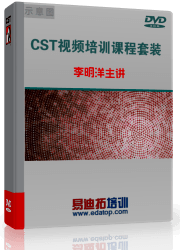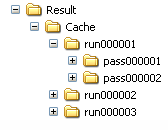- 易迪拓培训,专注于微波、射频、天线设计工程师的培养
CST2013: Result Data Cache Overview
The result data cache may be used to save the results of sequential solver runs for a single project in different result folders.
Naming convention of the result folders
The whole result data cache is stored in the result data cache folder. This folder is the project's sub-folder ResultCache.
The result data cache folder contains several sub-folders. Each of these contains the result data of one solver run. The sub-folders are named starting with the prefix ”run” and ending with the number of the run. The numbers of the runs are increased sequentially.
| |
If mesh adaptation is activated, further sub-folders are created where the result data for the solver runs with the different meshes are stored. They are named starting with the prefix ”pass” and ending with the number of the pass. The numbers of the passes are increased sequentially. |
What data is stored in the result cache
All data of the project is stored in each subfolder. This includes not only the 1D, 2D and 3D result data, but also the whole project as it was configured at the time when the solver run was started.
How to access the data in the result cache
You may easily access the result data by opening the project stored in one of the subfolders of the result data cache folder.
In the Macros menu, there exists a convenient command for comparing multiple runs: Wizard / Compare multiple runs
Area of application
The result data cache may be used together with the optimizer or the parameter sweep. Thus, the results of each solver run are stored in one subfolder named as described above automatically.
Note: The use of the result data cache may lead to a high use of disk space.
 最全面、最专业的CST微波工作室视频培训课程,可以帮助您从零开始,全面系统学习CST的设计应用【More..】
最全面、最专业的CST微波工作室视频培训课程,可以帮助您从零开始,全面系统学习CST的设计应用【More..】
频道总排行
- CST2013: Mesh Problem Handling
- CST2013: Field Source Overview
- CST2013: Discrete Port Overview
- CST2013: Sources and Boundary C
- CST2013: Multipin Port Overview
- CST2013: Farfield Overview
- CST2013: Waveguide Port
- CST2013: Frequency Domain Solver
- CST2013: Import ODB++ Files
- CST2013: Settings for Floquet B


